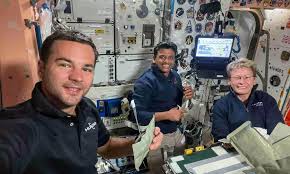What Shubhanshu Shukla is studying at ISS

India has made remarkable strides in space exploration over the years, and now, history is being scripted again. Group Captain Shubhanshu Shukla, one of the four astronauts selected under the prestigious Gaganyaan programme, is currently aboard the International Space Station (ISS) as part of the Axiom-4 mission. He has become the first Indian to conduct scientific experiments in space, marking a major milestone for India’s space research ambitions.
From Air Force Pilot to Space Pioneer
Shubhanshu Shukla began his career as a fighter pilot in the Indian Air Force, but his journey has now taken him into orbit. He is among the select few chosen for India’s ambitious human spaceflight programme, Gaganyaan, and has undergone intensive astronaut training in India and Russia.
Now, he is representing India as part of an international crew on the ISS. The mission is not just about flying to space—it’s about conducting meaningful research that will have real-world implications for both space travel and life on Earth.
What Is He Studying Aboard the ISS?
Shukla is overseeing and contributing to seven groundbreaking experiments, all designed by Indian scientists and researchers. These experiments explore diverse areas—from space biology and biotechnology to mental health and agriculture.
1. Muscle Loss and Stem Cell Study (Myogenesis)
One of the most critical experiments focuses on understanding how human muscles degenerate in microgravity. Known as the Myogenesis study, it investigates muscle stem cell behavior in space. In zero gravity, astronauts can lose up to 20% of their muscle mass in just two weeks. By analyzing how these cells grow and change without gravity, researchers hope to develop better muscle therapy techniques, not only for astronauts but also for older people and those with degenerative muscle conditions on Earth.
2. Digestive Adaptation in Space
Shukla has also recorded a video demonstrating how digestion works in space. This experiment is part of an educational outreach initiative aimed at helping students understand how the human body adjusts to zero gravity. It highlights the importance of adaptability in biological processes and serves as a vital tool for science communication.
3. Mental Health and Brain-Computer Interface Research
Isolation and confinement during space missions can significantly impact mental health. To address this, Shukla is participating in experiments that use functional near-infrared spectroscopy (fNIRS)—a cutting-edge brain-computer interface. This study explores how brain activity is affected during prolonged isolation and tests systems that could eventually allow astronauts to control spacecraft using just their thoughts. The findings will benefit space missions and mental health studies on Earth alike.
4. Cultivating Microalgae for Sustainable Space Life
Another fascinating experiment involves the growth of microalgae such as Spirulina. These microscopic plants are rich in proteins, vitamins, and minerals. Shukla is examining their potential as a space food supplement, which could play a key role in closed-loop life-support systems on long-duration spaceflights. The research also aims to make these organisms a reliable nutritional resource for malnourished populations on Earth.
5. Crop Seed Germination in Zero Gravity
Can crops grow in space? Shukla is finding out by conducting a seed germination experiment with fenugreek (methi) and green gram (moong dal)—staples in Indian diets. The experiment seeks to determine how microgravity affects seed sprouting and early plant development. This study is crucial for developing space farming techniques, especially for missions to the Moon or Mars.
6. Studying Tardigrades – Earth’s Toughest Life Forms
Tardigrades, or “water bears,” are microscopic creatures known for surviving extreme conditions—from boiling temperatures to radiation and even space vacuum. Shukla’s experiment studies their molecular resilience mechanisms in space. If we understand how tardigrades survive, it could open the door to new technologies in biotechnology and medicine.
7. Space-Grade Biotechnology Tools
Lastly, Shukla is testing small, biotech devices designed for in-orbit applications. These devices could one day be used to diagnose illnesses, monitor health, or even create medicines in space, without needing Earth-based labs.
Why This Mission Matters
This mission is not just about India’s pride in space exploration—it’s about what these space experiments mean for our future.
- Human spaceflight is evolving rapidly, and research like this ensures that countries like India can be at the forefront.
- The data gathered from these studies will help ISRO prepare for long-term missions, like sending astronauts to the Moon or building space stations.
- The findings could lead to breakthroughs in healthcare, agriculture, and mental wellness, proving that space research can have a direct benefit for people on Earth.
Inspiring the Next Generation
One of the biggest wins from this mission is inspiration. Shukla’s educational outreach through the digestion experiment is already being used in classrooms to teach students about space biology. It sends a powerful message: space is not beyond our reach.
His journey shows that with the right training, support, and vision, India can lead not just in launching satellites but also in human-centric space science.
Conclusion
Group Captain Shubhanshu Shukla’s journey aboard the ISS is a historic moment for India. Through a series of innovative experiments—ranging from muscle loss and stem cells to algae growth and crop germination—he is pushing the boundaries of what’s possible in space. But even more importantly, he’s contributing to research that could improve lives on Earth, build a sustainable future for space travel, and inspire generations of young Indians to dream big.
His mission isn’t just 400 kilometers above Earth—it’s also a giant leap forward for India’s place in the universe.






